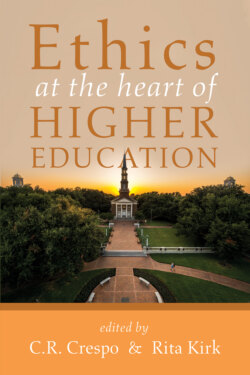Читать книгу Ethics at the Heart of Higher Education - Группа авторов - Страница 7
На сайте Литреса книга снята с продажи.
Introduction
ОглавлениеWe used to believe that our ethics are learned at our mother’s knee, that the formation of our ethics is completed at an early age. But that is not true. Our ethics are developed throughout our lives, first as children from our family, then by modeling others we hold in regard, and further influenced by interactions with our peers, communities, media, books, and environment. In previous generations, education supplemented religious teaching by implementing and practicing the manners of civil society. Students were taught to read, reason and debate. They practiced memorizing lofty words of wisdom through declaration and poetry. Yet that is not the education today. Despite the hand-wringing of critics, students today have more knowledge available to them than can be absorbed; mastery of a subject area creates siloes where most every course is tailored to comprehending subject matter that may be outdated before they graduate. But learning is more than subject-matter expertise.
This book begins with the questions that plague academics who are unsure of the proper role of ethics courses in the curriculum. What should an ethics course seek to do? What are its outcomes and measures of success? Our fast-paced environment requires instantaneous reactions to complex questions. Our instant messaging age champions quick response over reflection or thought—even the president governs by Twitter. Yet the ethical dilemmas are no less complex than the subject matter; cyber security, prison reform, labor rights, abortion, artificial intelligence, or gun laws are common table topics over lunch. Struggling through that complexity is central to understanding its implications for our culture. As scholar D. Stephen Long so eloquently writes in his chapter, “It is insufficient to inform students that they already have an ethical formation. It must be subject to examination.”
This book brings together some of the leading ethicists in the country together to consider the rightful place of ethics in the university today. Twenty years ago, William F. May, a distinguished ethics scholar, set the foundation for an ethics program at SMU when he stated, “A university does not fully discharge its duties to its students if it hands out knowledge—and the power that knowledge yields—without posing questions about its responsible uses.” Philosophy, religious studies and theology professors still engage students on topics related to contemporary moral issues but there is another movement on campuses, one that we should support: the teaching of applied ethics by professors of practice. When a self-driving car hits a pedestrian because it misinterpreted a sign, or when another corporation defrauds its investors, we will wish that we had spent more time thinking not only of what it is possible to do with our knowledge but also what is right, just, and honorable. Educators have a duty to empower students to cultivate their character, ethically assess situations and prepare them for an ever-hostile world. However, just as accomplished professionals look to physicians, lawyers, and engineers when they need the help of a professional, so too can individuals look to ethicists for solving complex moral issues.1
The question of the proper role of ethics courses in the university curriculum takes on particular debates when considered in light of the secular focus of most universities. Robert Howell considers this debate in light of our own experiences in developing an undergraduate curriculum that requires ethical education for all students. So what does it mean when we say we teach ethics? As he addresses the issue of the Secular University’s Dilemma (“either Morality and Ethics encode God’s will [and thus have a religious backing] or they are merely a matter of cultural custom”), Howell claims that the debate does not lessen the importance of the concepts.2 In fact, in a highly secular world of diverse belief frames, learning how to reason with one another across religious and cultural contexts is more important than ever. Contextualized in the framework of Howell’s concept of “Google Ethics,” he explains the criticality of doing more than what is thought to be right and just. Students must also know why they do what they do.
This book also provides a much-needed overview of the field of Christian ethics, including the Social Gospel movement, Christian realism, Catholic social teaching, the proper role of the state in social and economic life, subsidiarity, religious liberty, human rights, the Christian right, and liberation theology. This grounding demonstrates the depth and complexity of Christian ethics and concludes that the rightful place for such thinking and debate also resides at the university.
The university faces unique institutional challenges when it claims a commitment to ethics education. Its core population is often comprised of the traditional college-aged student who is leaving home perhaps for the first time, faced with an expanded range of possible experiences, seems unaware of the consequences for risky behavior, and is certainly not thinking about the impact of actions on the image of the university. To be fair, students are not the only ones who make poor choices, perhaps not even the most impactful ones. Still, our country is blessed with some excellent university ethics programs, numerous ethics-based community groups, and shelves of books to enlighten our journey. Yet as David Brooks, author of The Road to Character, notes, “We’ve accidently left this moral tradition behind. Over the last several decades, we’ve lost this language, this way of organizing life. We’re not bad. But we are morally inarticulate.”3 It’s time we got that back. Our future depends on it.
That’s why this book is important.
1. See Charles Curran, chapter 3.
2. See Robert Howell, chapter 2.
3. Brooks, Road to Character, 15.
